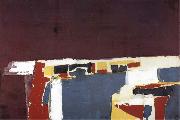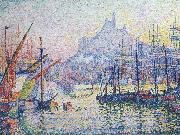Wholesale Oil Painting No Minimum |
|||||||||||
|
|
|||||||||||

|
|||||||||||
|
|
|
||||||||
Nicolas de StaelRussian Painter.1914-1955 was a painter known for his use of a thick impasto and his highly abstract landscape painting. He also worked with collage, illustration and textiles Nocolas de Stael was born in the family of a Russian Lieutenant General, Baron Vladimir Stael von Holstein, (a member of the Stael von Holstein family, and the last Commandant of the Peter and Paul Fortress) and his wife, Olga Sakhanskaya. De Stael's family was forced to emigrate to Poland in 1919 because of the Russian Revolution; Both, his father and stepmother, would die in Poland and the orphaned Nicolas de Stael would be sent with his older sister Marina to Brussels to live with a Russian family (1922). He eventually studied art at the Brussels Acad??mie royale des beaux-arts (1932). In the 1930s, he travelled throughout Europe, lived in Paris (1934) and in Morocco (1936) (where he first met his companion Jeannine Guillou, also a painter and who would appear in some of his paintings from 1941-1942) and Algeria. In 1936 he had his first exhibition of Byzantine style icons and watercolors at the Galerie Dietrich et Cie, Brussels. He joined the French Foreign Legion in 1939 and was demobilized in 1941. |
||||||||
|
|
||||||||
Marseilles
Marseilles Painting ID:: 35965 |
mk107
1954
Oil painting
89x130cm
mk107 1954 Oil painting 89x130cm |
|||||||
|
|
||||||||
Paul Signac1863-1935 French Paul Signac Galleries Paul Victor Jules Signac was born in Paris on November 11, 1863. He followed a course of training in architecture before deciding at the age of 18 to pursue a career as a painter. He sailed around the coasts of Europe, painting the landscapes he encountered. He also painted scenes of cities in France in his later years. In 1884 he met Claude Monet and Georges Seurat. He was struck by the systematic working methods of Seurat and by his theory of colours and became Seurat's faithful supporter. Under his influence he abandoned the short brushstrokes of impressionism to experiment with scientifically juxtaposed small dots of pure colour, intended to combine and blend not on the canvas but in the viewer's eye, the defining feature of pointillism. Many of Signac's paintings are of the French coast. He left the capital each summer, to stay in the south of France in the village of Collioure or at St. Tropez, where he bought a house and invited his friends. In March 1889, he visited Vincent van Gogh at Arles. The next year he made a short trip to Italy, seeing Genoa, Florence, and Naples. The Port of Saint-Tropez, oil on canvas, 1901Signac loved sailing and began to travel in 1892, sailing a small boat to almost all the ports of France, to Holland, and around the Mediterranean as far as Constantinople, basing his boat at St. Tropez, which he "discovered". From his various ports of call, Signac brought back vibrant, colourful watercolors, sketched rapidly from nature. From these sketches, he painted large studio canvases that are carefully worked out in small, mosaic-like squares of color, quite different from the tiny, variegated dots previously used by Seurat. Signac himself experimented with various media. As well as oil paintings and watercolours he made etchings, lithographs, and many pen-and-ink sketches composed of small, laborious dots. The neo-impressionists influenced the next generation: Signac inspired Henri Matisse and Andr?? Derain in particular, thus playing a decisive role in the evolution of Fauvism. As president of the Societe des Artistes Ind??pendants from 1908 until his death, Signac encouraged younger artists (he was the first to buy a painting by Matisse) by exhibiting the controversial works of the Fauves and the Cubists. |
||||||||
|
|
||||||||
|
|
marseilles
marseilles Painting ID:: 71319 |
mk290 1906 35x45in metropolitan museum of art new york gift of robert lehman 1955 mk290 1906 35x45in metropolitan museum of art new york gift of robert lehman 1955 |
||||||
|
|
||||||||
|
Paul Signac 1863-1935 French Paul Signac Galleries Paul Victor Jules Signac was born in Paris on November 11, 1863. He followed a course of training in architecture before deciding at the age of 18 to pursue a career as a painter. He sailed around the coasts of Europe, painting the landscapes he encountered. He also painted scenes of cities in France in his later years. In 1884 he met Claude Monet and Georges Seurat. He was struck by the systematic working methods of Seurat and by his theory of colours and became Seurat's faithful supporter. Under his influence he abandoned the short brushstrokes of impressionism to experiment with scientifically juxtaposed small dots of pure colour, intended to combine and blend not on the canvas but in the viewer's eye, the defining feature of pointillism. Many of Signac's paintings are of the French coast. He left the capital each summer, to stay in the south of France in the village of Collioure or at St. Tropez, where he bought a house and invited his friends. In March 1889, he visited Vincent van Gogh at Arles. The next year he made a short trip to Italy, seeing Genoa, Florence, and Naples. The Port of Saint-Tropez, oil on canvas, 1901Signac loved sailing and began to travel in 1892, sailing a small boat to almost all the ports of France, to Holland, and around the Mediterranean as far as Constantinople, basing his boat at St. Tropez, which he "discovered". From his various ports of call, Signac brought back vibrant, colourful watercolors, sketched rapidly from nature. From these sketches, he painted large studio canvases that are carefully worked out in small, mosaic-like squares of color, quite different from the tiny, variegated dots previously used by Seurat. Signac himself experimented with various media. As well as oil paintings and watercolours he made etchings, lithographs, and many pen-and-ink sketches composed of small, laborious dots. The neo-impressionists influenced the next generation: Signac inspired Henri Matisse and Andr?? Derain in particular, thus playing a decisive role in the evolution of Fauvism. As president of the Societe des Artistes Ind??pendants from 1908 until his death, Signac encouraged younger artists (he was the first to buy a painting by Matisse) by exhibiting the controversial works of the Fauves and the Cubists. marseilles mk290 1906 35x45in metropolitan museum of art new york gift of robert lehman 1955 |
||||||||
|
|
||||||||
|
Prev Next
|
||||||||
|
|
||||||||
|
Related Paintings to Paul Signac :. |
||||||||
|
|
||||||||
|
CONTACT US |


